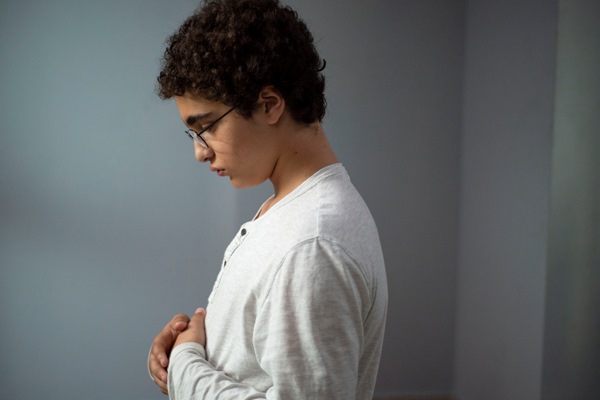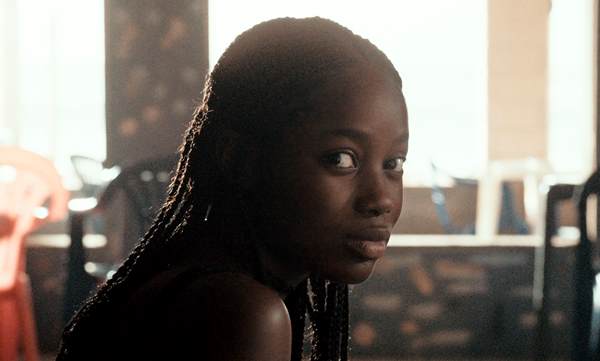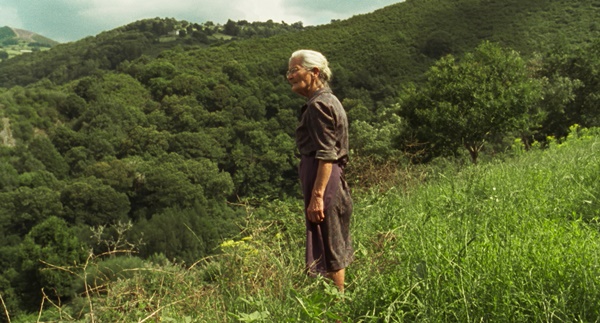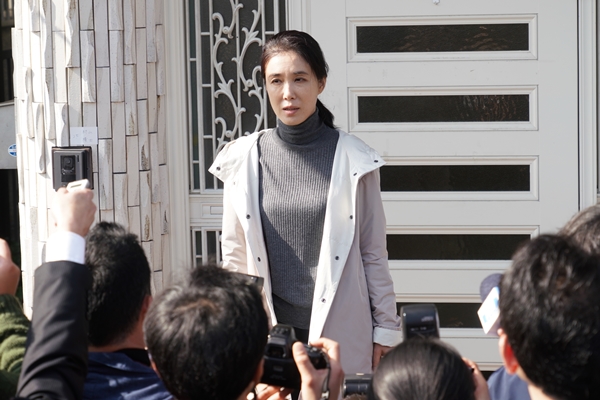
The New York Film Festival rightly has a feather in its cap this year: the world premiere of Martin Scorsese’s long awaited, old-fashioned, and star-studded gangster epic The Irishman. It also offered an advanced peek of Todd Phillips’s revisionist and polarizing spin on Batman mythology in Joker (the type of high-profile, studio movie that would have not likely been seen at NYFF a decade ago.)
Despite these big Hollywood titles, the festival nevertheless leans toward the European art house. In many ways, for New Yorkers attending the NYFF, it’s almost like going to the Cannes Film Festival, but without the jetlag, the exchange rate, and the overpriced accommodations. The event is practically a condensed Cannes, since more than half of the main slate’s selections this year debuted this spring in the South of France and feature a heavy dose of French-language movies to boot.
Meanwhile, newer films that are premiering this fall are outnumbered by the Cannes selections. Scandinavia is given short shrift, even though, year to year, it offers as much diversity in terms of genres and storytelling as that of the larger French film industry. Once again, NYFF has overlooked Roy Andersson, whose latest film, About Endlessness, won the Silver Lion for Best Direction at Venice last month. His meticulously directed Golden Lion Award winner, A Pigeon Sat on a Bench Reflecting on Existence, was also not invited to the NYFF in 2016.
Nevertheless, there are a handful of films that will likely stand out as year-end top 10 candidates. Based on what I’ve seen so far, that would include an atypical film from the Romanian New Wave, Corneliu Porumboiu’s plot-driven, noir tribute and crime caper The Whistlers. After playing in New York and other fall festivals, it will be released in February 2020.
Then there are the movies in the middle, where the debate centers on what has greater weight, a film’s strengths or its flaws. Such is the case with the latest effort by Cannes favorites Jean-Pierre and Luc Dardenne, Young Ahmed, a novella of a film that introduces a premise but then doesn’t quite expand upon it.
A curly-haired, slightly cross-eyed, bespectacled Belgian-Arab boy of about 13, Ahmed (Idir Ben Addi) refuses to shake the hand of his female math teacher, Madam Inès (Myriem Akheddiou). He also chastises his white Belgian mother, calling her a drunk for cooking the evening meal while having a glass of wine—all in the first 10 minutes. The teen has no father figure, except for Imam Youssouf (Othmane Moumen), who has a vendetta against the teacher, calling her an infidel for teaching Arabic after school by using the Koran, as well as for dating someone outside her faith. Among other edicts, the imam has taught Ahmed that Muslims cannot live among Jews and Christians.
The Dardennes won Best Director at Cannes, so one might assume Young Ahmed is among their top films. It’s close to the bottom, actually, and only a partial return to form after their unconvincing and predictable The Unknown Girl. Once again, they have gathered an ensemble of convincing nonprofessionals mixed with established actors. Unfortunately, the results are terse, so that the abrupt ending—the climax—leaves many questions that the filmmakers may not have intended, such as why Ahmed has become a fanatic for one. Unlike their other films, where the core character must take a turn at a fork in the road, Ahmed’s life-changing decision is made for him through an accidental intervention. The scenario, which fails to transcend its setup to something more nuanced, is dangerously close to stereotypical.

Mati Diop became the first black female director to have a movie in the Cannes competition with her debut feature film, Atlantics, for which she won the Grand Prix. Set in a coastal town in an unnamed West African metropolis, her movie stands out for its combination of tones and moods—the nocturnal and atmospheric supernatural sequences and on-the-street locations—along with a terrific melancholic and spacey score by Fatima Al Qadiri.
Diop blends social realism and the otherworldly with a bit of melodrama. A young woman, Ada (Mame Bineta Sane), is pressured by her family to marry the local rich guy, who has scored from real estate developments, most likely on the backs of the poorly paid—if compensated at all—labor force. However, she’s really in love with Souleiman (Traore). While depressed and lying in her bed, her closest friends, one of whom is a bit of an adventurer while the other is more cautious and traditional, give her the news that Souleiman has set out on a rickety boat with other young men and women bound for Europe.
There is no disguising that most of the cast is green, led by a diffident lead performance. It’s hard to believe Ada’s lost in her own thoughts, whether she’s staring out into the white glare of the ocean or figuring out how she can get out of her engagement—this is a director’s piece, not an actor’s. Financed largely by European funding, the film will represent Senegal for the Best International Feature at next year’s Oscars.
Last May, acclaimed director Céline Sciamma (Tomboy) made her first competition appearance at Cannes with the 18th-century period piece Portrait of a Lady on Fire, and won the Best Screenplay honor. The first hour of the gorgeously filmed—on location in Brittany—chamber piece moves fleetingly as a game of cat-and-mouse. A young female painter arrives to the isolated chateau of an aristocratic family to surreptitiously paint the portrait of a strong-willed mademoiselle, who has to marry a Milanese nobleman. (A portrait is needed to seal the deal between the families). However, after a visually dazzling and nimble first half, the momentum deflates in the second hour as the film becomes more conventional, though the characters are anything but conformists behind closed doors.

Perhaps the most innocuous and out of place selection in the NYFF main slate was also first seen at Cannes, Oliver Laxe’s Fire Will Come. It certainly was beautifully filmed in the village of the director’s grandparents in Spain’s Galicia region, with its foggy nighttime forests and the deep greens of the hillside. Yet the film feels more like an introduction to a time and place than a complete narrative.
Amador (Amador Arias), who has served a two-year sentence for starting a wildfire, returns back into the folds of his hard-working elderly mother, Benedicta (Benedicta Sánchez). As he walks onto the family farm, she only asks him, “Are you hungry?” and they reestablish their daily rituals. They are the holdouts; their neighbors are converting their farms into tourist bed and breakfast destinations.
The slice-of-life vignettes introduce intriguing, credible characters, who stand out in contrast to the imposed ambiguity of the tight-lipped ending, which shifts the focus to the community and how it treats Amador after another forest inferno has destroyed the countryside. Still, this natural (or is it?) disaster is spectacularly filmed—on Kodak 16mm film, no less.

That said, the festival has chosen a film by an up-and-coming filmmaker that first screened at the Locarno Film Festival, Koji Fukada’s A Girl Missing, a steadily absorbing crime thriller with at least two satisfying twists. It centers on a not-so-reliable protagonist, Ichiko (Mariko Tsutsui, alternatively enigmatic and vivacious). Like with a good mystery by Sue Grafton, more alert viewers will pick up the subtle hints of a major plot point early on. Though Fukada directs his cast to remain circumspect, he pans the camera to point out clues or information he wants viewers to know.
At first glance, Ichiko’s a mild-mannered, middle-aged wallflower; an extraordinarily attentive homecare nurse to a locally famous painter; and a considerate tutor to her client’s two young granddaughters, who are studying to become nurses. Ichiko also, ah, habitually stalks a neighbor, a younger man, whom she spies on nightly—her apartment overlooks his. When her public façade is ripped off, she comes face-to-face with cancel culture after she reluctantly, to say the least, becomes a person of interest when one of her students goes missing. The movie will be released next year by Film Movement.
One takeaway from the award winners at Cannes is that the jury was honoring emerging filmmakers at the expense of slicker, though more consistent filmmakers directing from novelistic, deftly constructed screenplays. Still, the festival jury, led by director Alejandro González Iñárritu, picked an unmistakable crowd pleaser for the Palme d’Or, Bong Joon-ho’s Parasite, featuring a linear steel trap of a script.
Bong makes every moment count in his Grand Guignol depiction of a family of grifters conning every member of a wealthy household. (It’s up for grabs whom the title refers to.) The most all-out entertaining Palme d’Or winner in years and a smash hit in the director’s native South Korea, it was also a hot ticket at NYFF with two sold-out screenings. Consider it another top-10 contender, along with The Irishman.
















Leave A Comment